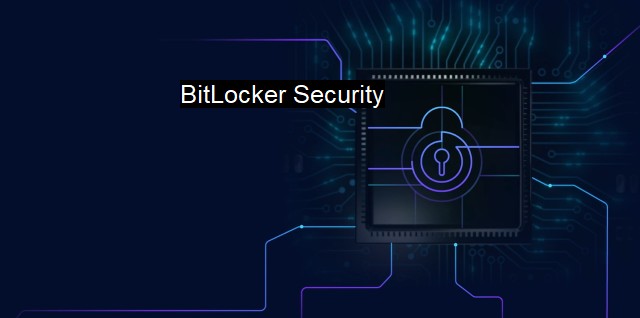What is BitLocker Security?
Fortifying Safeguarding Strategies in the Digital Era with BitLocker Security: A Comprehensive Analysis
BitLocker Security is a crucial feature incorporated into Microsoft Windows that is primarily designed to offer enhanced security for stored content, particularly on storage devices. Employing several potent exhaustive encryption algorithms, it discourages unrestricted third-party access, thereby serving as an efficient deterrent against potential threats seeking unauthorized intrusion into private databases. This integrated security algorithm relies heavily on uninterrupted complex encryption protocols to provide an additional level of security to drive data.Acting as a close-knit, efficient insulator against cybersecurity threats, BitLocker emphasizes protecting user data. When enabled, BitLocker encrypts each file stored in the device's storage and then decrypts these files only for user-permitted data retrieval or data modification processes. In this scenario, BitLocker ensures authorized access by confirming the user's secure login attempt, further highlighting its significance in terms of safeguarding sensitive data.
Originally developed for Microsoft's Windows Vista, BitLocker has evolved significantly over the years in its expansive efforts to maintain pace with rapidly advancing cybersecurity threats. Presently, it encrypts entire storage devices within the specified computer system, employing Advanced Encryption Standard (AES) with customizable key lengths varying from 128 to 256 bits, accompanied by an additional diffuser for broadened encryption. This type of full-drive encryption guarantees whole-system file security, not only preserving the confidentiality of personal data but also protecting system files and applications.
The primary method for BitLocker activation lies in the user-instructed, secure encryption key setup. During the initial setting phase, BitLocker requests the user to establish an encryption key that possesses heavy restrictions concerned with complexity and uniqueness. This encryption key, once set, is required every times the user attempts to access the protected data bank. There are also recovery methods established during set-up, which can provide a backup access strategy if users should forget their initial encryption key.
Over the years, BitLocker Security's wider acceptance has primarily revolved around its trusted, infallible reputation and the broad range of its competent decryption methodologies. From demanding a Unicode-compatible Personal Identification Number (PIN) or pressuring the usage of enforced Microsoft Smart Cards to facilitate safe physical decryption to advocating the emergency utilization of an authorized 48-digit recovery key, BitLocker assures encrypted data's sound protection via diversified retrieval strategies.
BitLocker’s aptitude in combating real world cyber threats is made evident with its use in the professional world, and its compliance with industry security regulations and standards. It helps maintain robust defenses against offline attacks, which occur when an attacker has physical access to the device’s hard disk. BitLocker secures data even if the system's security is breached or the operating system itself is offline, experimentally proving its competence against potential-targeted cyber espionage and commonplace malware attacks.
BitLocker's distinct credibility lies in its striking versatility, reasonably demonstrated by its promising compatibility with multiple Windows versions, most notably including Windows Pro and Windows Enterprise. its developed indications affirm BitLocker's efficacy in running on multiple disk sector formats and establishing a distinctive measure of user-generated external key input systems.
In elucidating the bears of antivirus principles, BitLocker competently inhibits harmful unauthorized access into regulated systems, thereby intensely reducing incoming cyber threats, including efficiently blocking potential virus attacks. By encrypting every file entering the user's database, BitLocker ensures a comprehensive lock of any suspicious compromising elements, reemphasizing the standardized files' and applications’ sound protection, bearing a comprehensive antivirus and cybersecurity role.
BitLocker Security illustrates an all-encompassing solution to sustain optimal data privacy, greater user control, and advanced antivirus protection. As cybersecurity threats continue to evolve, BitLocker continually updates and enhances its methodologies to compress cyber threats effectively, delivering trusted security capable of protecting sensitive user data consistently and steadfastly.

BitLocker Security FAQs
What is BitLocker security?
BitLocker is a full-disk encryption feature in Windows operating systems that helps protect all data on a Windows workstation or server. BitLocker encrypts the entire drive that Windows and your data reside on and can also encrypt external drives.What is the purpose of BitLocker security?
The purpose of BitLocker security is to protect sensitive data on a system in case of loss or theft. BitLocker ensures that unauthorized users cannot access the data without the proper credentials, even if the drive is removed from the system or the computer is stolen.Is BitLocker security enough to protect against all cyber threats?
While BitLocker security provides strong encryption, it is not a complete cybersecurity solution. It only encrypts data on the hard drive and does not protect against malware or viruses. To fully secure a system, additional cybersecurity measures such as antivirus and firewall software are necessary.Can BitLocker security be bypassed?
In general, BitLocker security cannot be bypassed without the proper credentials. However, there are some vulnerabilities in certain versions of BitLocker that could potentially allow skilled hackers to bypass the encryption. It is important to keep the BitLocker software up to date to avoid any known vulnerabilities.| | A | | | B | | | C | | | D | | | E | | | F | | | G | | | H | | | I | | | J | | | K | | | L | | | M | |
| | N | | | O | | | P | | | Q | | | R | | | S | | | T | | | U | | | V | | | W | | | X | | | Y | | | Z | |
| | 1 | | | 2 | | | 3 | | | 4 | | | 7 | | | 8 | | |||||||